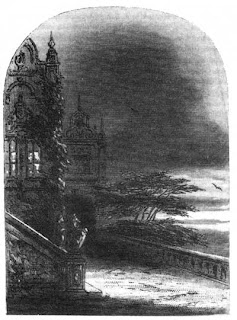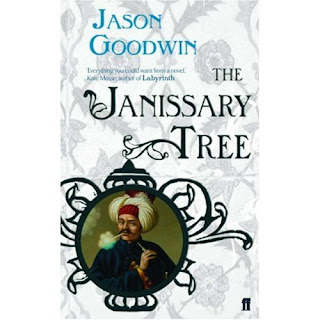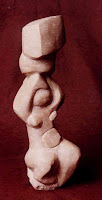
As if on cue: The weather, after a month of people killing heat-wave, turns to rain - persistent and misery inducing.
In Bleak House, the weather is as bad.
We are still following events through the eyes of Esther, who seems to be developing into ‘our heroin’. She wakes and is induced to go for a walk thought the foggy, early morning streets around the Chancery – with the inevitable accompaniment of the slightly-lacking people she seems destined to pick up on her way through life – Miss Jellyby to the forefront.
After the equally inevitable reminders of Miss Jellyby’s mother’s negligence, and heavy indications that ‘the wards in the case’ are getting on rather more strongly than distant cousins need to fulfil family duty, up pops the mad woman.
We are not destined to learn her name – she is the ‘little old woman’ she is ‘our hostess’, she is ‘the lodger’; she is the great anonymous: Details, if ever known, now lost and only to be revealed on ‘Judgement Day’.
Another unknown is presented to us in Nemo – advertising on the door of the shop above which the old lady lives where there is a difficulty gaining entrance.
What isn’t kept long from us is the landlord and shop’s owner, Mr Krook. (Crook for bent and deformed? Or crook for criminal?)
We soon lean what is either ignored in t.v. adaptations or passed quickly over – he is the second Chancellor! And proud of it.
Surround by endless papers in dusty, fading piles; unknowing, uncomprehending what he has or what its value; holding on, not selling – accumulating the detritus of other people’s lives.
Suddenly, that most powerful of Dickensian tools, the physical description, so attractive to designers yet so inaccessible visually, clicks in – the shop is a metaphor – chaos and confusion - physical, mental, moral, spiritual; with a bent old cipher sitting enthroned in the centre.
Guard to this treasure house is the most vicious cat in literature.
Up in the lodger’s rooms we discover a barren place with captured birds – again, not the pretty yellow canaries tweeting careless of their captivity, so beloved of the filmmakers – dusty, nearly dead things the RSPCA would instantly prosecute you for – and gas out of their misery.
The camera lens can only capture what it sees, it fails to grasp the multi-layering that comes with the multi-perspective a good novelist can give.
Esther’s ‘Morning Adventure’ in this New (if not brave) World bruises through a thuggery of words that are only more numbing because of the naiveté of the narrator.
The day progresses and we move into sunlight and refreshing air as the three young people continue their journey to start residence at Bleak House.
It is a tiring journey but the natural optimism of Esther shines through – and we eventually enter the most un-bleak of houses. Mr Jarndyce awaits – an old man terrified of thanks and totally incapable of accepting other people’s faults.
He is a stark contrast to Krook but Dickens makes an intriguing parallel in the settings where we find these two: Irregularity. Bleak House might be, in Esther’s words, “Delightfully irregular,” but there is no doubt in the reader – all is not well.
Like Krook, Mr Jarndyce is in a physical and, by implication, moral and psychological maze. Esther has not only been thrust into it, but is soon given the keys and made housekeeper.
Another odd aspect of Mr Jarndyce is his ability to bring the weather indoors. The closest expression of disapproval and unpleasantness he is capable of is to comment on the direction of the wind: “From the east,” gives Mr Jarndyce, “an uncomfortable sensation.” One suspects the sensation, originating in the foibles of humanity he refuses to recognise, is the source of his meteorological observations. By the end of this chapter, in fact, a full-blown gale is being summoned.
Resident at Bleak House is Mr Harold Skimpole, the personification of innocence and childlike understanding according to both himself and Mr Jarndyce. Others might, after hearing the tale he tells of his employment in Germany, suspect a lazy good-for-nothing exploiting consciously the weakness of others. Esther and Richard soon fall victim to him, being forced to hand over money to prevent Skimpole being hauled off to gaol – and it is Mr Jarndyce’s discovery of this which prompts his tempestuous predictions.
As expected though, Esther signs off her shift as narrator with a, and “. . . hopefully to bed.”
But Dickens has not done with us – bookend like, the omniscient persona of ‘our author’ returns to give a little coda on ‘The Ghost’s Walk’.
This is a deceptive title. Superficially it is the thrill seeking description so beloved of the tour guide – for, what is the content of this chapter but a guided tour of Chesney Wold, Lady and Baronet Dedlock’s sodden country house in Lincolnshire?
Mr Guppy, from London, suggesting a higher legal status than his lowly clerkdom, gains access with a friend, and is shown around the house by the housekeeper’s protégé, Rosa. They are accompanied by the housekeeper’s grandson who is visiting and who provokes in Rosa a beauty intensifying self-consciousness that doesn’t escape the notice of Mrs Rouncewell, grandmother and solid feature of the house.
Guppy notices a portrait the likeness in which he feels to be familiar, but he cannot, for the moment place. It is of the present Lady Dedlock, but Mr Guppy has never seen her.
The tour concludes, as always, with a view over ‘The Ghost’s Walk’ – a terrace with the sort of less-than-respectable history guaranteed to thrill the respectable, rising middle-class viewer of country houses.
Once Guppy has been shown out by a young gardener, Mrs Rouncewell, widowed some time ago and with two sons, one gone bad, the other risen and grandson producing, reveals more of the true nature of the walk.
Some long dead Dedlock, cursing the family, walks the Walk whenever disaster and disgrace is coming to the proud family. The sound of her footsteps, despite loud-ticking musical clocks, will be heard, through the beat and the notes, as Rosa now hears them, and as Lady Dedlock claims to have heard.
Is he ghost’s walk the terrace? No, it is the sound produced by that wonderfully Dickensian touch-of-the-gothic, predicting the final humbling of an over-proud house. It is the unendurable, to Lady Dedlock, dripping of the rain.
(A little late publishing, but read on time!)






